|
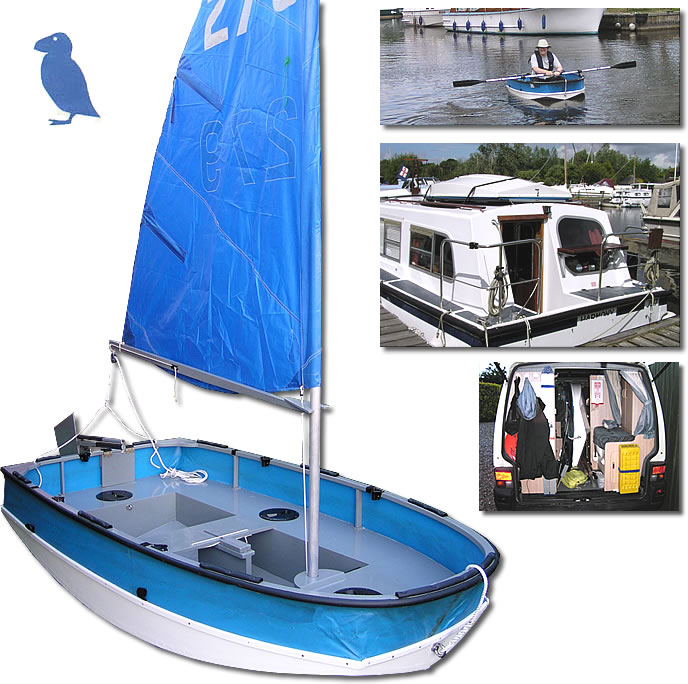
The 'Puffin' was designed in the 1960's by Barry Bucknell and supplied
by Polycell Prout, of Canvey Island, Essex. It was available either
ready built or in kit form, with a Hull made from glassfibre, or
plywood.
She was built
like a smaller version of the Mirror Dinghy, the wooden versions
being constructed via the same 'stitch and glue' technique, which
required no frames, and was very simple for amateurs.
Equipped with
a dagger board, rudder and 30sq ft sail plan, she could be sailed,
rowed or powered by a small outboard motor.

I was
lucky enough to find one for sale on eBay from the family of the original
owner, so it was absolutely complete, even with the original documentation
and instructions. As the photos show, it was in very good condition for
it's age, with no signs of any rot or decay.
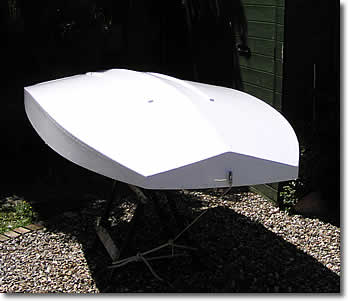 |
I carefully
removed all of the fittings and 'skirt' from the hull and scraped
all of the paint off with a hot air gun.
I then reinforced
all of the seams with new 2" glassfibre tape and epoxy
resin.
The hull was
then treated to 3 coats of International primer, two coats
of Pre-coat undercoat, and finally two coats of Trilux
top coat.
|
 |
I sanded the
deck and inside and painted it with three coats of grey 'Danboline'
bilge paint, which I find covers well and is very hard wearing.
Four RWO
inspection hatches were fitted to the buoyancy compartments to enable
inspection and also allow simple dry stowage.
The original
PVC topsides 'skirt' was refitted, with a new rubbing strake.
|
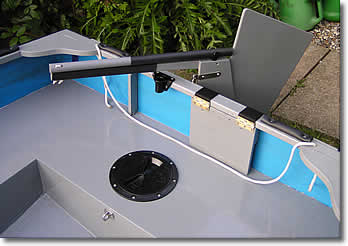 |
This photo shows
the simple flexible tiller extension, a length of 22mm plastic water
pipe tied loosely to the tiller with 6mm bungee cord, with shrink
sleeve tubing as a grip, and a clip to hold it in place along the
top when not in use.
(Ok, so you're
not going to 'sit-out' such a small dinghy, but it's essential to
sit well forward when solo !)
Also visible
is the rear rowlock for sculling.
|
 |
The original
mast arrangement is very simple, the bermuda sail being set on a
two section aluminium unstayed mast.
This is stepped
in this simple socket arrangement.
|
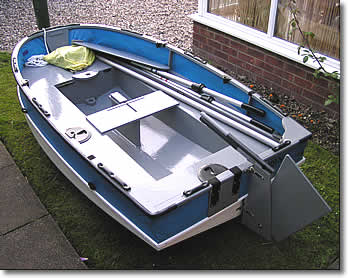 |
All of the sailing
kit can be easily stowed within the boat.
I fitted two
sets of rowlocks to enable rowing from the centre or bow seats,
depending on the load.
|
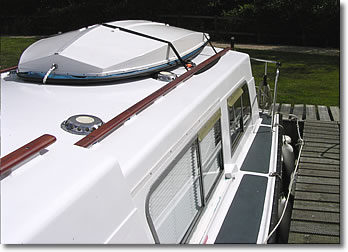 |
When
used as a tender to my Hampton
Safari, the ability for the hull to be collapsed to half it's
height allows it be stored on the cabin roof without being too obtrusive. |
 |
She goes well
with the electric outboard, as long as I sit in the centre of the
boat, (I'm a foot too short for my body weight). The Minn Kota drives
her along at up to 5mph, in complete silence.
(The tiller
extension is a piece of 1.5" waste pipe shaped with a hot air
gun to fit the twist grip.)
|
The original
1960's brochures (click any page to view
it in a larger window).

|
 |
The original
1968 pricelist....
(remember though,
an average week's wages was about £20 in those days ! )
|
|

